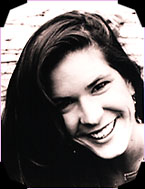
Ashley Warlick

interviewed by Emma Taylor on July 8, 1996

Ashley Warlick, 23, graduated from Dickinson College in 1994. Two months later she was married and had finished her first novel, "The Distance from the Heart of Things," which was published by Houghton Mifflin in April 1996. She is also the youngest winner of the Houghton Mifflin Literary Fellowship (previous winners include Robert Penn Warren, Elizabeth Bishop and Philip Roth).
"The Distance from the Heart of Things" is the story of Mavis Black, who returns home to her family's vineyards in Edisto, South Carolina after four years away at college. Ashley Warlick talks to Tripod about writing, the South, how a 22-year-old (Mavis) got so wise, and how a 23-year-old (Ashley) got so far.
Tripod: When did you begin this novel?
AW: It was the first semester of my junior year; I was twenty.
Tripod: Did you know from the beginning that you were writing a novel?
AW: Well, no, not really. I had a couple of writing workshops with Robert Olmstead, who was a writer-in-residence at Dickinson College where I went, and I was hooked. I knew that I was very interested in writing. I was unable to get a workshop my junior year because I had a job, but I was able to finagle an independent study, which required thirty pages of fiction.
I finished my thirty pages and I was late getting done. I had lots of worries about those thirty pages because I just finished in the middle of a sentence and turned them in. I really wasn't interested in saying, "It's a novel, it's not a novel." I knew what I was working on was going to take me longer than a semester. It was going to take me longer than thirty pages. After I turned in the first part of the book, I really got some encouragement to continue it and go on and make it a novel, and that was really all I was interested in doing. I like the spaces that novels allow.

"I like the spaces that novels allow."
Tripod: A lot of students wouldn't even know where to start to get their work published. How did you get your novel published so quickly?
AW: Well that was really due to the good graces of Robert Olmstead. He put me in contact with an agent in New York who worked with his agent. He was a wonderful editor -- most of the editing I did on the book was for him. Part of it was being in the right place at the right time, as corny as that sounds.
Tripod: You finished this novel before you graduated?
AW: Yes. Well, shortly after I graduated. I had wanted, of course, to finish it before, and kept not getting it done. So I rented a couple of rooms from a librarian at my college for the summer and finished it in July. It was sold in November of '94.
Tripod: Have you noticed any resentment from older writers or people your age who think you just got lucky?
AW: I've certainly had a couple of reviews that have taken that angle. One in particular -- God! A friend of mine sent me a review that had been on the Internet that was just foul! I mean, really, this person really took me to task for being young.
Tripod: They put your success down to your age?
AW: Yeah, yeah. There was a similar case in the "Boston Globe." But a lot of other people have been very generous, and have said nice things about me being young.
Tripod: When you wrote this novel, did you have an audience in mind? Your own generation, or women, perhaps?
AW: No, I don't really write that way. And I've had people try to pin me down and say, "Well, of course you write for an audience, of course you write with someone in mind." And I just flat don't.

" One review on the Internet was just foul! This person really took me to task for being young."
Tripod: So were you surprised when you were called a "southern writer," or a "women's writer"?
AW: Well, no, because quite obviously I am. I write from a female sensibility and I write from a very Southern sensibility. I am not living in the South now and miss it. It's just what I'm interested in. That was one of the nice things about working with this book the way I did. I was really able to play with my strengths. There is not much plot in the book, and I'm not very good at plot. I think that's something you really only get to do with a first novel. You say, "This is what I'm really good at, and I know there are things that aren't there and the men aren't that strong, and the plot is almost non-existent, but there are some other things that make the book work." Next time, you don't get that sort of grace!
Tripod: So is there a lot of pressure on you now, in terms of what you will do next?
AW: Oh, no, no. Well, I guess there's always pressure, but it's really quite exciting. I can do this, and now I want to do it differently, and better.
Tripod: What will you do next?
AW: I've been working on another novel. In fact, I started notes on it before I'd even finished "The Distance from the Heart of Things." It is set in the South, again, alternately in Charlotte -- which is the town I grew up in -- and Galveston, Texas.
Tripod: Is "The Distance from the Heart of Things" autobiographical?
AW: I would say, characteristically, no. Mavis' life has certain parallels to mine. We were about the same age. When I was a small child, my father and my grandfather had vineyards in South Carolina, and so a lot of the setting came from those details that I could remember, and things that I could ask my dad about. But Mavis is a wholly different person than I am. A better person, in a lot of ways!

With your first novel, you say, "This is what I'm really good at, and I know there are things that aren't there." Next time, you don't get that sort of grace!
Tripod: In a way, the character of Mavis is a little unbelievable. She's so together and so wise. She seems to know exactly what she wants in her life, and she learned this after four years in college. It's quite a break from the angst-filled twenty-something protagonist.
AW: Well, I think that young angst is just a particularly current thing. Mavis is a person who is 22 years old, and in a lot of places in the world, that person is responsible for all of their decisions, possibly their family's decisions. 22 is not that young. And if you go back and look at the earlier part of the century, you'll find that 22 is not an irresponsible, undecided age.
Tripod: And that's one of the things I noticed -- your novel seems like it could have been set anywhere in the past fifty years or so.
AW: Actually, my thinking on that -- and this is strictly for agricultural reasons, as most of the vineyards were out of South Carolina by the late seventies, early eighties -- was that this book was set in the early eighties. But I purposely did not track a definite time period in the book.
Tripod: Were you conscious of writing with a southern dialect? Because the book comes across as very southern, but you don't have much of a southern accent at all.
AW: Yes, the book does have a really southern cadence to it and I suppose I was aware of that. When I go home, I am very interested in the different ways that southerners put sentences together: the ways that someone from Charleston will put together sentences, as opposed to someone from Raleigh. It is something that I'm very conscious of, and like to listen to. But it isn't a permanent part of my style, it was just really intrinsic to this book.

" I think that young angst is just a particularly current thing."
Tripod: Lee Abbott said of you, "Lordy, to get this good Warlick has obviously signed a pact with every sweet-talking devil in hell." If it wasn't that, what was it? How did you learn to write?
AW: I have always read voraciously. Since the time I could read, my mom would check out stacks of books from the library. I'd send her back in a week and she couldn't believe that I had read all of them. So I really learned to write from reading. I did not write in high school, I did not write as a child, beyond what was required of me. I didn't keep a journal -- I tried keeping a diary once, but it ended up about four pages long! When I got to college, I took these workshops and it just made sense. I wanted to do something with my life where I could be really close to books, and this just seemed the way to do it.
Tripod: Which writers do you most admire, and which writers influence you?
AW: Well, quite obviously, I really appreciate Robert Olmstead's work. Joy Williams has a book, "State of Grace," that I love. John Gregory Brown and John Duframe are both wonderful writers. There's a young writer, W. Glasgow Phillips, with a first novel out called "Tuscaloosa." That's one of my favorites. My brother was just in town last night and we were talking about that book, as I gave it to him for Christmas. It's just such a gas!
Tripod: Where would you place yourself among today's young writers, and which writers do you think you're like?
AW: I've had people say to me that I sound like Kay Gibbons or Gail Godwin. I don't ever feel that way, and I'm not saying that I have a particularly original style. I just would never put myself in the position of saying I am like a writer whose books everybody on earth has read.
Tripod: But you think of yourself as a writer?
AW: Yes, definitely, but that's very different from how I think of Kay Gibbons as a writer. Somehow, her writing is much more glamorous!
